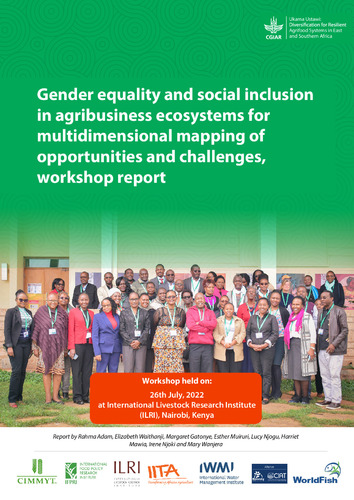Gender equality and social inclusion in agribusiness ecosystems for multidimensional mapping of opportunities and challenges: Workshop report
Abstract
Agribusiness in Kenya has been growing tremendously as more people continue to realize its benefits. It is mainly driven by the abundant natural resources readily available in Kenya. Agribusiness has created employment opportunities for women and youth who are locked outside formal employment. Which leads to the question: are agribusiness opportunities equitably distributed in terms of gender and social inclusion?
Kenya’s agribusiness ecosystem is replete with challenges and opportunities regarding gender equality and social inclusion (GESI). Thus, a workshop on Gender Equality and Social Inclusion in Agribusiness Ecosystems for Multidimensional Mapping of Opportunities and Challenges was convened on 26 July 2022, at the International Livestock Research Institute (ILRI) headquarters in Nairobi, Kenya. The goal was to better understand GESI opportunities and challenges, and how to tap and address them. The workshop was convened under the auspices of the One CGIAR partnership strategy of integrated research that aims to achieve a food-secure future. For East and Southern Africa (ESA), this is through the Ukama Ustawi Initiative.
The workshop objectives were: (i) to identify the challenges or barriers that inhibit the inclusion of women, youth and people living with disabilities (PLWDs) from participating in agribusiness ecosystem and benefitting from available opportunities; (ii) to understand how social networks and digital platforms can catalyze GESI; and (iii) to inform the development of a pan-ESA digital network.
From workshop deliberations, there was consensus that indeed there are barriers that prevent women and youth from fully participating in agribusiness ecosystems. These barriers are sociocultural or economic, reinforced by causal relationships between them. Therefore, interventions to counter these barriers must of necessity also be sociocultural and economic. Notably however, sociocultural factors cause both positive and negative economic outcomes.
During gender-disaggregated focus group discussions (FGDs) held during the workshop, similar enablers and challenges were reported by both the men-only and women-only FGDs. One striking difference was that women’s discussions were more focused on operational matters revolving around gender roles and responsibilities, while men FGDs paid more attention to policy matters. Even so, whether operational or policy-related, the factors highlighted fell within the dichotomy of sociocultural and economic causes and effects. Both groups of men and women addressed women and youth GESI issues, with an occasional and unsystematic mention of PLWDs— perhaps because PLWDs were not represented at the workshop.
Much still needs to be done to ensure GESI in agribusiness in Kenya becomes successful, and to close the gap that still exists between women and men agri-entrepreneurs. There is an urgent call to action for further research to effectively, sustainably and contextually address GESI in Kenya’s agribusiness ecosystems. Research is also needed to explore innovative ways to tackle the challenges, particularly on using digital platforms.
Four main takeaways from the workshop were: (i) the importance of PLWD representation, as well as women, vulnerable and marginalized groups (WVMGs) in future workshops; (ii) agribusiness networks and digital platforms as enablers for accessibility and affordability; (iii) it appears there is fear of the unknown around GESI; (iii) the positive effects of networks do not alone necessarily close the gender gaps, nor overcome barriers: these effects must be bolstered by supplementary efforts such as combinations of interventions, e.g. enhancing access combined with affirmative action to accelerate access for the more vulnerable groups to particular benefits.

